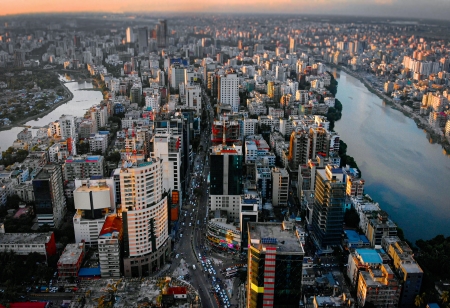
Bangladesh's development is experiencing extreme dynamics, which is aiding in contributing to the country's increasing economic growth. Its rising economic growth helps to raise people's living standards. Bangladesh which is also known as the Asian Tiger, is the continent's fastest-growing economy, according to some reports. Major Investments, funding has allowed the East Asian blessing for exploration for developing the countries, which is in the special mode for Bangladesh. With an optimistic focus on the challenge of being an Asian Tiger, data collected suggest articles, journals, and reports of different national and international organizations, websites, and newspapers related to the topic of problem analysis.
It is known that Bangladesh is on the right economic track, but corruption and weak institutions are the major problems that need solutions which is possible for Bangladesh to attain super prime tag in the business world. The transformation of education and training systems in almost all East Asian countries over the last few decades has been ecstatic. There was a noticeable improvement in educational facilities and training grounds. The development of secondary school cognitive lessons is comparable to and exceeds the high skill levels of high-income countries. Public spending on primary and secondary education has been prioritised in order to generate a more skilled workforce for rapid growth.
Past Development of the Asian Tiger Economies
In the 1980s, countries such as Indonesia, Korea, and Thailand spent more than 80% of their education budgets on basic education. Fertility declined on one hand, and on the other, there was a consistent budget for education, and as a result, every child had more resources for being skilled than in other developing countries. Following that, education became more focused on technical skills, and some people imported educational services, and vocational and technical workers became well suited to achieving rapid economic growth.
Bangladesh Economy Before the urging of the Japanese government, twenty years ago, it was published that the first attempt for understanding the origin policy, the East Asian extraordinary economic success became the largest talked about in the Southeast Asian countries.
Bangladesh's economy is crucial to the development of South Asia and the emerging market economy. The nation’s economy is the 35th largest in the world in fewer terms and the 25th largest by purchasing power parity, making it the second-largest in South Asia. A number of financial institutions have been keeping an eye on the country as one of the upcoming economies in the middle class segment of the market. Bangladesh is also a member of the South Asian Free Trade Area and the World Trade Organization in the frontier market.
In fiscal year 2021-2022, Bangladesh registered a GDP growth rate of 7.2 percent after the world pandemic. Bangladesh is one of the fastest growing economies in the world. Industrialization in Bangladesh received an important impetus after the Indian partition because of the labor reforms and new industries. Between 1947 and 1971, East Pakistan generated between 70 percent and 50 percent of exports in Pakistan. Following the independence in 1971, Bangladesh emerged on economic reforms in the late 1970s, promoting free markets and foreign direct investment. By the 1990s, the country had a stupendous ready-made garment industry. Remittances from the large Bangladeshi communities became a vital source of income. Agriculture in Bangladesh is protected by the government subsidies ensuring self-sufficiency in food production.
Conclusion
Bangladesh has practiced export-oriented industrialization. Bangladesh emerged again into the growth after the pandemic with macroeconomic stability, with improvements in infrastructure, which is a growing digital economy, and growing trade flows. Tax collection remains very low with tax revenues accounting only for 7.7 percent of GDP. Bangladesh has a banking sector with a large production of non-performing loans and loan defaults that have caused high concerns. The private sector has almost 80 percent of GDP and the Dhaka Stock Exchange and Chittagong Stock Exchange are the renowned stock markets in India. Most of the business in Bangladesh are owned by private companies, and it is projected that the small and have 90 percent of the businesses.
We use cookies to ensure you get the best experience on our website. Read more...